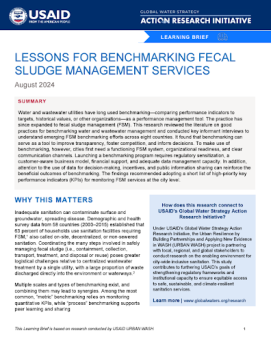Water and wastewater utilities have long used benchmarking—comparing performance indicators to targets, historical values, or other organizations—as a performance management tool. The practice has since expanded to fecal sludge management (FSM). This research reviewed the literature on good practices for benchmarking water and wastewater management and conducted key informant interviews to understand emerging FSM benchmarking efforts across eight countries. It found that benchmarking can serve as a tool to improve transparency, foster competition, and inform decisions. To make use of benchmarking, however, cities first need a functioning FSM system, organizational readiness, and clear communication channels. Launching a benchmarking program requires regulatory sensitization, a customer-aware business model, financial support, and adequate data management capacity. In addition, attention to the use of data for decision-making, incentives, and public information sharing can reinforce the beneficial outcomes of benchmarking. The findings recommended adopting a short list of high-priority key performance indicators (KPIs) for monitoring FSM services at the city level.
This learning brief, developed by USAID URBAN WASH, presents key findings and recommendations from this research.


